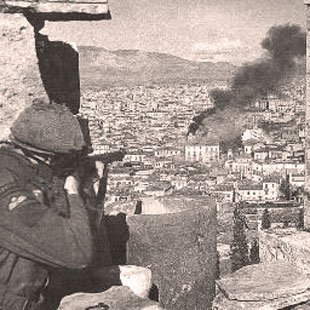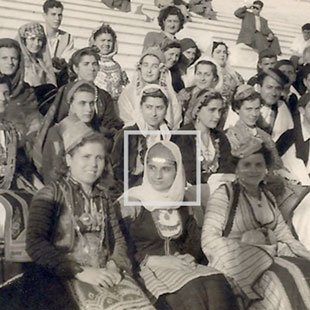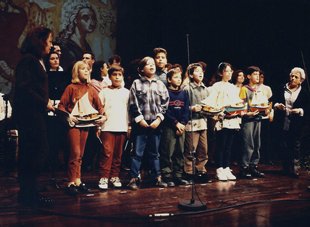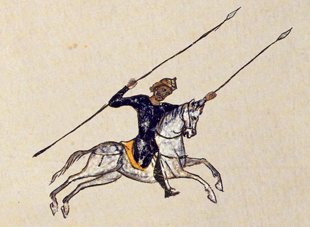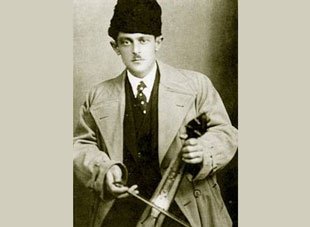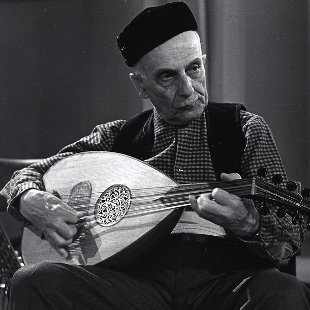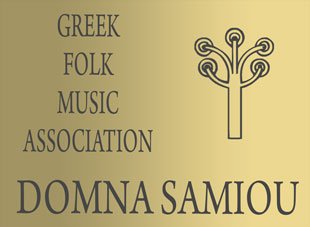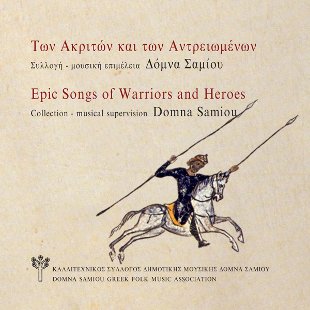You are at: Home page Her Work List of Songs Tsamandas
The Fight of Tsamados With His Son
Ο Τσάμαντας
Listen
Lyrics
Up at Saint Thodoros' chapel,
at the church of Saint Kostantinos,
there are twelve circles dancing
and eighteen rings set up for wrestling.
The people are dancing and saying and praying:
- Christ forbid that Tsamandas come,
pray make it that he does not show,
for if he does, there'll be no more celebration.
No sooner were the words out of their mouths
than Tsamandas came into view crossing the plain,
holding a tree over his head for shade.
- A good day to you all. - Welcome, Tsamandas,
won't you sit down to eat, sit to drink, sit and enjoy yourself.
- I didn't come here to eat, to feast and to drink.
I came to wrestle with you, to see how brave you are.
[Of all the revellers gathered there, not a soul said a word
save Kostantis, who turned to him and said:
- I'm worthy, I'm strong. I'll rip you to shreds.
They walked down to a marble threshing floor to fight.
Where Kostantis gripped, blood flowed in rivers,
where Tsamandas gripped, hunks of flesh went flying.
- Hold your horses, Kostis. I've something I would ask you.
Where's your family from, which family were you born to?
- My mother's a Berber, my father from Constantinople.
- Then come let me embrace you, beloved blood of my blood.]
Translated by Michael Eleftheriou
Original Lyrics
Ο Τσάμαντας
Η πάλη του Τσαμαδού με το γιο του
Πάνω στον Αϊ-Θόδωρο, στον Ά- στον Άγιο Κωσταντίνο,
χορεύουν δω- χορεύουν δώδεκα χοροί,
χορέ- χορεύουν δώδεκα χοροί και δε- και δεκοχτώ παλαίστρες,
χορεύουνε και λέγανε, χορεύουνε και λένε.
- Χριστέ μην έρθει ο Τσάμαντας, Χριστέ μου μην προβάλει,
γιατί σαν έρθει ο Τσάμαντας χαλάει το πανηγύρι.
Ο λόγος 'κόμα λέγεται, ο λόγος 'κόμα στέκει
κι ο Τσάμαντας αγνάντισε, στον κάμπο κατεβαίνει,
δεντρί κρατεί στο χέρι του, ίσκιο του κεφαλιού του.
- Ώρα καλή σας, βρε παιδιά. - Καλώς τον Τσαμαντένιο,
κάτσε να φας, κάτσε να πιεις, κάτσε να διασκεδάσεις.
- Εγώ δεν ήρθα για φαγί, να φάμε και να πιούμε,
μόν' ήρθα να παλέψομε, να δω την αντρειά σας.
[Κανείς δεν απ'λοήθηκε μεσ' απ' το τσουρμολόι,
ο Κωσταντής του μίλησε, ο Κωσταντής του λέει.
- Εγώ 'μαι άξιος δυνατός, πιάνω σε κομματιάζω.
Εβγήκαν και παλέψανε σε μαρμαρένιο αλώνι,
εκεί που πιάν' ο Κωσταντής ποτάμι πάει το αίμα,
εκεί που πιάν' ο Τσάμαντας, κομμάτια τον πετάνε.
- Αγάλια αγάλια, βρε Κωστή, για να σε αρωτήσω,
'πό πού κρατά το σόι σου και πού κρατάει η σειργιά σου.
- Η μάνα μ' απ' τη Μπαρμπαριά, πατέρας μου απ' την Πόλη.
- Για σίμωσε, βρε Κωσταντή, η φλέβα της καρδιάς μου1.]
1φλέβα της καρδιάς μου: πολυαγαπημένε μου
Information
- Region: Propontis
- Categories: Acritic Song
- Rhythm: 4 beats
- Dance style: Syrtos
- Duration: 05:31
Collaborators
- Singer: Domna Samiou
- Constantinopolitan lyra: Socrates Sinopoulos
- Kanun: Panos Dimitrakopoulos
- Constantinopolitan lute: Socrates Sinopoulos
- Lute: Kostas Philippidis
- Bendir (frame drum): Andreas Pappas
- Informant (source of the song): Foto Karadima
Albums
Notes
The song's central theme is an encounter and fight between two men who are father and son, but do not know it. Like other poetic motifs shared by any number of songs, the wrestling match between father and son is common to various heroic songs and epic narratives from numerous ethnic traditions.
Tsamandas or Tsamados (his name varies from place to place), the gigantic hero with the amazing physical strength, shows up out of the blue at banquets and celebrations to challenge the bravest man there, bringing the feast to an early end with his brutish behaviour. The courageous lad called Kostantis who accepts his challenge is usually referred to as ‘the widow's son’ - a frequent characteristic of brave men -, which means born out of wedlock, as will be made clear at the end of the song. The outcome of the bout varies: in some variations, like this one, the song ends with father and son recognizing each other for who they are; in others, the lad's mother intervenes, offering Tsamandas, her lover, wine, and Kostantis, her son, poison; in others still, the son ultimately kills the father.
The way in which Tsamandas bursts into the feast recalls similar scenes in which Digenis attends the wedding of King Levandis' daughter uninvited and abducts the bride (see song The abduction of Levandis’ daughter by Digenis), or in which Charon challenges Digenis to the fatal fight (see song Charon wore black). The French neo-Hellenist Guy Saunier argues that the song of Tsamandas may well have provided the model for the theme of Digenis and Charon1 and that it is the oldest form of songs in which a son is set in a contest with his father, having nothing to do with the epic of Digenis and the akrites. Miranda Terzopoulou (2017)
1G. Saunier, Ελληνικά Δημοτικά Τραγούδια. Συναγωγή μελετών, G. Andreiomenos (ed.), Ι. Botouropoulou (trans.), Athens 2001, p. 241.
Recording information
Studio recording, 2004.
Domna Samiou recorded this song in Amarinthos (or Vathia) in Euboea, in 1978, sung by Foto Karadima, born in 1913 in Prastio of Marmaras (Prokonissos), where they sang it and danced on St. Constantine's day.
Excerpt from the concert with acritic songs in the framework of the ACRINET (European Network for Acritic Tradition) conference, "Ioannis Drakopoulos" amphitheater, Athens, November 24, 2002.
